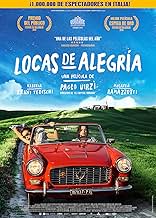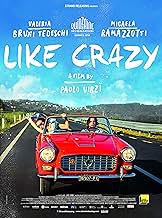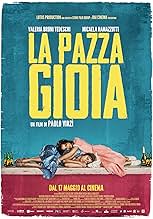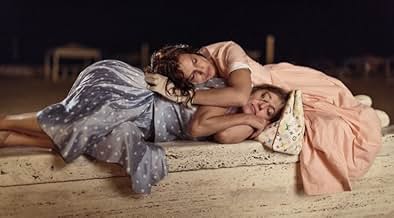IMDb-BEWERTUNG
7,1/10
10.554
IHRE BEWERTUNG
Zwei ganz unterschiedliche Frauen entkommen einer psychiatrischen Anstalt, um die Toskana in einem gestohlenen Auto zu sehen und sich kennen zu lernen.Zwei ganz unterschiedliche Frauen entkommen einer psychiatrischen Anstalt, um die Toskana in einem gestohlenen Auto zu sehen und sich kennen zu lernen.Zwei ganz unterschiedliche Frauen entkommen einer psychiatrischen Anstalt, um die Toskana in einem gestohlenen Auto zu sehen und sich kennen zu lernen.
- Auszeichnungen
- 30 Gewinne & 30 Nominierungen insgesamt
Luisanna Pandolfi
- Luisanna, la caposala
- (as Luisanna Messeri)
Mimma Pirré
- Suor Diletta
- (as Mimma Pirrè)
Empfohlene Bewertungen
One of the key players of current Italian cinema, Paolo Virzì's newest offering LIKE CRAZY brings audience to the sun-drenched Toscana, where nestles a home for the mentally unstable (a picturesque mise-en-scène peppered with creditable employees and patients), there we meet Beatrice (Tedeschi), a motormouth screwball who can compulsively babble on and on as long as she can find an audience, and Donatella (Ramazzotti, Ms. Virzì in real life), a diffident introvert masked by her tattoo-embroidered body and punk appearance, who is ailed by depression and a tendency of violence.
Beatrice befriends the newly arrived Donatella, who becomes the newest recipient of her predominantly one-sided pattering, but Beatrice also reciprocally brings a pint of energy into Donatella's colorless life, for the clinical aspect, they transmit salutary influences on each other, a defining vindication of the existence of such communal facilities. One day, during a field day, when their pick-up is late, Beatrice impulsively dashes to a bus with Donatella tagging along, against others' opposition, hence the duo embarks on a journey fueled by spontaneous decisions and devil-might-care drollness, if not wholly realistic, a similar mode of Ridley Scott's THELMA AND LOUSIE (1991) except that there will be no place for body count and radical feminist manifesto to temper Virzì's well wrought combo of farce and drama.
The onus of farcical bombast is aptly falls upon the shoulders of Ms. Tedeschi, and it is pretty much up her alley to conjure up an inexorably flamboyant character takes no prisoners in her maniacal loquacity, verbally challenges, needles, assaults everyone she meets or around her, which sometimes feels too specific for an Italian-speaking context, her "crazyness" is unequivocally the driven force of the duo's on-the-run caper, but at moments when sensibility and sagacity is required, e.g. during the conversation with the foster parents of Donatella's son, she can also function as a qualified interlocutor who is not self-absorbed and eloquent enough to make her points clear. Yes, Donatella has a toddler son which she has to forsake due to her unwell conditions, and it is through Donatella's back-story, where clichéd scenario of a woman buffeted by unworthy parents, atrocious sleazes and a traumatic severance between a mother and her son hits all the notes, life renders her completely helpless and disillusioned, but even so, miraculously, buoyed up by Beatrice's undimmed vivacity and "craziness", eventually Donatello procures a glimpse of hope in the faintly mawkish encounter with her unwitting tot, to predictably affix a non-confrontational ending to this ostensibly rebellious yarn against bureaucracy, authority, patriarchy and the Establishment.
Both actresses register impressive performances albeit the script isn't always coruscating with golden ideas, Tedeschi dominates in her unfettered oomph and gumption while Ramazzoti diametrically sears in her distressed transmogrification, but it is the former's all-out flair entrances audience, not just being a brazen laughing-stock, underneath Beatrice's grandiloquent veneer, there lies a dysfunctional human being dragged into neurosis and illusion through her own dopiness and those inimical exterior forces, from this regard, both are nevertheless victims on similar grounds, but ultimately, it seems, Virzì consciously cops out to unleash its sociological critique and instead, sends a more anodyne message of a circular conclusion without disturbing the status quo.
Beatrice befriends the newly arrived Donatella, who becomes the newest recipient of her predominantly one-sided pattering, but Beatrice also reciprocally brings a pint of energy into Donatella's colorless life, for the clinical aspect, they transmit salutary influences on each other, a defining vindication of the existence of such communal facilities. One day, during a field day, when their pick-up is late, Beatrice impulsively dashes to a bus with Donatella tagging along, against others' opposition, hence the duo embarks on a journey fueled by spontaneous decisions and devil-might-care drollness, if not wholly realistic, a similar mode of Ridley Scott's THELMA AND LOUSIE (1991) except that there will be no place for body count and radical feminist manifesto to temper Virzì's well wrought combo of farce and drama.
The onus of farcical bombast is aptly falls upon the shoulders of Ms. Tedeschi, and it is pretty much up her alley to conjure up an inexorably flamboyant character takes no prisoners in her maniacal loquacity, verbally challenges, needles, assaults everyone she meets or around her, which sometimes feels too specific for an Italian-speaking context, her "crazyness" is unequivocally the driven force of the duo's on-the-run caper, but at moments when sensibility and sagacity is required, e.g. during the conversation with the foster parents of Donatella's son, she can also function as a qualified interlocutor who is not self-absorbed and eloquent enough to make her points clear. Yes, Donatella has a toddler son which she has to forsake due to her unwell conditions, and it is through Donatella's back-story, where clichéd scenario of a woman buffeted by unworthy parents, atrocious sleazes and a traumatic severance between a mother and her son hits all the notes, life renders her completely helpless and disillusioned, but even so, miraculously, buoyed up by Beatrice's undimmed vivacity and "craziness", eventually Donatello procures a glimpse of hope in the faintly mawkish encounter with her unwitting tot, to predictably affix a non-confrontational ending to this ostensibly rebellious yarn against bureaucracy, authority, patriarchy and the Establishment.
Both actresses register impressive performances albeit the script isn't always coruscating with golden ideas, Tedeschi dominates in her unfettered oomph and gumption while Ramazzoti diametrically sears in her distressed transmogrification, but it is the former's all-out flair entrances audience, not just being a brazen laughing-stock, underneath Beatrice's grandiloquent veneer, there lies a dysfunctional human being dragged into neurosis and illusion through her own dopiness and those inimical exterior forces, from this regard, both are nevertheless victims on similar grounds, but ultimately, it seems, Virzì consciously cops out to unleash its sociological critique and instead, sends a more anodyne message of a circular conclusion without disturbing the status quo.
One of my top ten movies of all time is One Flew Over the Cuckoo's Nest. It still holds up 48 years after its' release. Crazy Life is sort of a step child of Milos Forman's masterpiece. While not as good as Jack Nicholson's best film, it is one of my favorite foreign films of the last ten years. Donatella and Beatrice are a couple of emotionally unstable women who meet at a mental hospital. They click on a shared level of being outcasts from normal society. The misfits team up for a really wild adventure. The actresses are tremendous, with a screen chemistry as good as I have ever seen. The script is both sad and funny, with a completely unpredictable story which kept me guessing from beginning to end. One slight drawback is the rapid fire dialogue here. If you do not speak Italian; and I don't, be prepared to speed read for two hours. Even with that, I highly recommend Crazy Life.
What a poor, non-requested and superficial rating from @dierregi; although the best thing about this platform is that everyone can express themselves, is so sad to read that. I advice to take @dierregi's review as an example : approach yourself to this movie in the opposite way!!! This is something about depression, loneliness, the fear of being unable to be back to a "normal life", the lack of consciousness about being unstable but also the great power of realizing it (see one of the last scene when Donatella confesses Beatrice, and herself too, what happened). This is also something about forgiveness, about giving a second chance and being mentally opened and ready to face reality, even if it's cruel, terrible, frightful. This is about a very difficult social phenomenon as well as a great lesson of embracing and not refusing.
I consider myself a fan of Paolo Virzì movies and this one did not disappoint me. And yet, I always come back with that feeling that he seems to be always just a step away from an accomplished masterpiece.
Like Crazy easily passes the minimum threshold of getting one involved and watch it to the end, in fact more than that. At 2 hours it's a longish movie whose end arrives sooner than expected. There's however something not quite fully realized in it, might it be the cutting, the repetition of certain schemes, the un-natural behavior of some of the characters. It's a bit like a poem where a few rhymes don't quite rhyme or the hidden meaning doesn't quite come through.
The acting is certainly not to be faulted: if this were a Hollywood movie, Micaela Ramazzotti would have undoubtedly qualified for an Oscar nomination. Bruni Tedeschi is great too but a bit over the top here and there. A better cutting would have been a great help, too as some themes are a bit repetitive. Taking away some 5 or 10 minutes would have greatly improved the flowing of the narration.
What can I say, I appreciate everything Virzì has done so far, he's surely a great director but I'm still expecting and betting that his best has yet to come.
Whenever I review a foreign language film, I fully realize many people won't bother watching the picture because it's not in English. This is a shame, as many of the better films I have seen have been in a variety of languages and with "Like Crazy", you'd be missing a very good movie.
The story begins in a psychiatric institution in Italy. Beatrice (Valeria Bruni Tedeschi) is a patient, though she won't admit this to anyone even herself. In her distorted mind, she is a countess and the old mansion used as a hospital was donated by her to treat these unfortunate people! So, while at times Beatrice looks and seems very normal, she is severely deluded and self-absorbed. When a new resident arrives, Beatrice decides to make Donatella (Micaela Ramazzotti) her own personal project. After all, she is a rich, benevolent lady and helping the unfortunates is her life! So how, exactly, does she 'help'? Yep she orchestrates an escape and soon the oddly matched pair are out on a joy ride complete with stolen car.
At this point in the movie, Paolo Virzi (who wrote and directed the picture) could have chosen to make the film a kooky comedy, like "Crazy People" or "The Couch Trip" which is what you might expect with a Hollywood film. Fortunately, "Like Crazy" does not go there but manages to be rather poignant as well as realistic. You learn more about Beatrice and Donatella and their lives outside the institution but there are no magic solutions to their problems. After all, they are indeed very ill and mental illness isn't particularly funny and is often quite tragic. Now this is not to say that ultimately this is a depressing or tragic film and it manages to say quite a bit while still being believable and compelling.
The story begins in a psychiatric institution in Italy. Beatrice (Valeria Bruni Tedeschi) is a patient, though she won't admit this to anyone even herself. In her distorted mind, she is a countess and the old mansion used as a hospital was donated by her to treat these unfortunate people! So, while at times Beatrice looks and seems very normal, she is severely deluded and self-absorbed. When a new resident arrives, Beatrice decides to make Donatella (Micaela Ramazzotti) her own personal project. After all, she is a rich, benevolent lady and helping the unfortunates is her life! So how, exactly, does she 'help'? Yep she orchestrates an escape and soon the oddly matched pair are out on a joy ride complete with stolen car.
At this point in the movie, Paolo Virzi (who wrote and directed the picture) could have chosen to make the film a kooky comedy, like "Crazy People" or "The Couch Trip" which is what you might expect with a Hollywood film. Fortunately, "Like Crazy" does not go there but manages to be rather poignant as well as realistic. You learn more about Beatrice and Donatella and their lives outside the institution but there are no magic solutions to their problems. After all, they are indeed very ill and mental illness isn't particularly funny and is often quite tragic. Now this is not to say that ultimately this is a depressing or tragic film and it manages to say quite a bit while still being believable and compelling.
Wusstest du schon
- WissenswertesFrancesca Turrini's debut.
- PatzerThe camera crane is reflected on the blue van as it enters the institution.
- SoundtracksSenza fine
Written and Performed by Gino Paoli
Top-Auswahl
Melde dich zum Bewerten an und greife auf die Watchlist für personalisierte Empfehlungen zu.
- How long is Like Crazy?Powered by Alexa
Details
- Erscheinungsdatum
- Herkunftsländer
- Offizielle Standorte
- Sprachen
- Auch bekannt als
- Like Crazy
- Drehorte
- Livorno, Tuscany, Italien(train station)
- Produktionsfirmen
- Weitere beteiligte Unternehmen bei IMDbPro anzeigen
Box Office
- Budget
- 15.000.000 € (geschätzt)
- Bruttoertrag in den USA und Kanada
- 107.362 $
- Eröffnungswochenende in den USA und in Kanada
- 5.799 $
- 7. Mai 2017
- Weltweiter Bruttoertrag
- 9.046.658 $
- Laufzeit
- 1 Std. 56 Min.(116 min)
- Farbe
- Seitenverhältnis
- 2.35 : 1
Zu dieser Seite beitragen
Bearbeitung vorschlagen oder fehlenden Inhalt hinzufügen
































